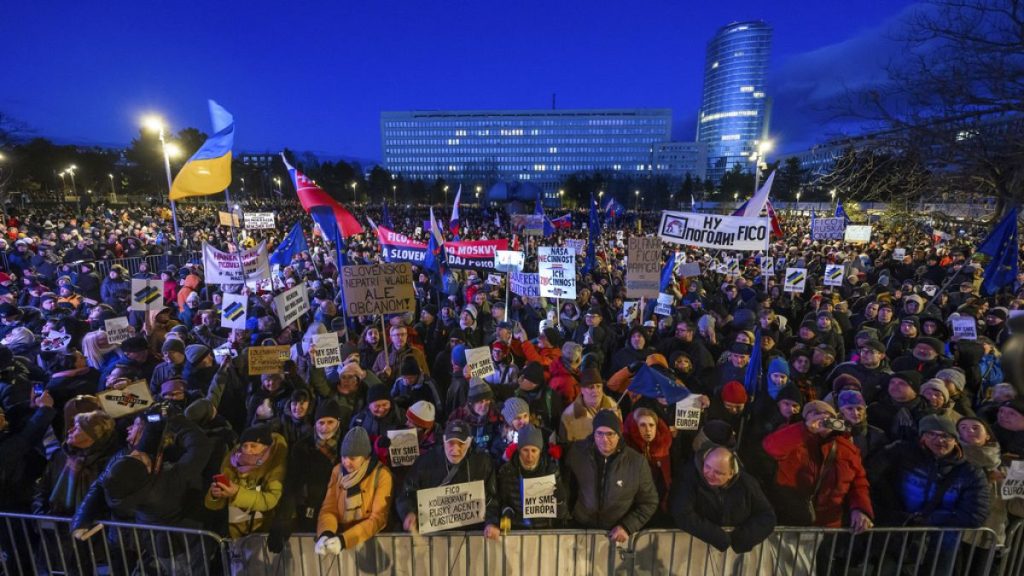The political landscape of Slovakia has been significantly disrupted by a series of large-scale protests ignited by Prime Minister Robert Fico’s perceived pro-Moscow stance and his controversial meeting with Russian President Vladimir Putin in December 2022. This meeting, the third between Putin and an EU leader since the onset of the war in Ukraine, sparked public outrage and fueled accusations that Fico was aligning Slovakia too closely with Russia amidst the ongoing conflict. The protests, which began in December immediately following the meeting and have continued into the new year, echo broader concerns across Europe about individual nations’ relationships with Russia, particularly in light of the invasion of Ukraine. The demonstrations have drawn thousands of participants to the streets of Bratislava, the capital city, voicing their disapproval through chants, signs, and a visible display of pro-European Union sentiment.
The underlying tension driving the protests stems from a complex interplay of geopolitical factors and domestic policy decisions. Fico’s meeting with Putin took place against the backdrop of the ongoing war in Ukraine and growing concerns within the EU about energy security and the potential influence of Russian narratives. The meeting also addressed Slovakia’s proposal to host peace talks, a move that some interpret as a legitimate attempt at mediation while others view it with skepticism, questioning Slovakia’s impartiality given Fico’s perceived affinity for Putin. Adding fuel to the fire was Fico’s subsequent threat to cut financial aid to Ukrainian refugees residing in Slovakia, a move ostensibly retaliatory against Ukraine’s decision to halt the transit of Russian gas through its territory to Slovakia. This threat further inflamed public opinion, galvanizing support for the protests and solidifying the perception of Fico as prioritizing Russian interests over Slovak and European solidarity with Ukraine.
The protests themselves have been marked by a strong pro-EU and anti-Fico sentiment. Demonstrators have waved EU and Slovakian flags, symbolizing their desire for closer ties with Europe and a departure from what they see as Fico’s pro-Russian leanings. Signs bearing messages such as “Fico go to Moscow!” and “We want to live in a free country!” reflect the public’s anxieties about Slovakia’s geopolitical trajectory and their desire for a government that aligns with democratic values and European integration. The chants of “Fico to resign,” “Enough of Fico,” and “Shame on the government” resonate through the streets, underscoring the depth of public discontent and the growing calls for a change in leadership. These demonstrations represent a powerful expression of the Slovakian people’s desire for their country to remain firmly rooted in the European democratic framework.
The public outcry against Fico highlights the delicate balance that Slovakia, like many other European nations, must navigate between maintaining energy security and upholding a commitment to democratic principles and solidarity with Ukraine. Slovakia’s historical ties with Russia, particularly in the energy sector, complicate its response to the current geopolitical crisis. Fico’s approach appears to prioritize these historical ties and energy considerations, potentially at the expense of aligning with the broader European response to Russian aggression. This balancing act is further complicated by the presence of a significant number of Ukrainian refugees within Slovakia, creating internal pressures related to humanitarian aid and social integration. Fico’s threat to withdraw financial support to these refugees, while purportedly linked to the gas dispute, has been widely condemned as inhumane and politically motivated, further exacerbating public anger.
The protests underscore the deep divisions within Slovak society regarding the country’s relationship with Russia and the appropriate response to the war in Ukraine. While some may view Fico’s actions as pragmatic attempts to secure Slovakia’s energy needs and potentially play a mediating role in the conflict, many others see them as dangerously close to appeasement and a betrayal of European solidarity. This division reflects the broader debate within Europe about how to effectively address the challenges posed by Russian aggression while minimizing the economic and social costs. The protests in Slovakia serve as a microcosm of this larger European struggle, highlighting the complex interplay of historical relationships, economic dependencies, and democratic values that shape national responses to the crisis.
The future trajectory of Slovakian politics rests in part on how Fico and his government respond to the ongoing protests. The demonstrations represent a significant challenge to Fico’s authority and raise questions about the direction of Slovakia’s foreign policy. Will he continue to pursue closer ties with Russia, potentially at the expense of his relationship with the EU and the Ukrainian people? Or will he heed the calls for a more pro-European stance and a greater commitment to supporting Ukraine? The answer to these questions will not only shape Slovakia’s domestic political landscape but also contribute to the broader European response to the ongoing crisis. The protests serve as a powerful reminder of the importance of public opinion and the role of civil society in shaping democratic processes, particularly in times of geopolitical uncertainty.














